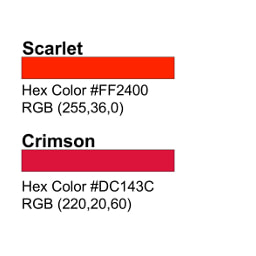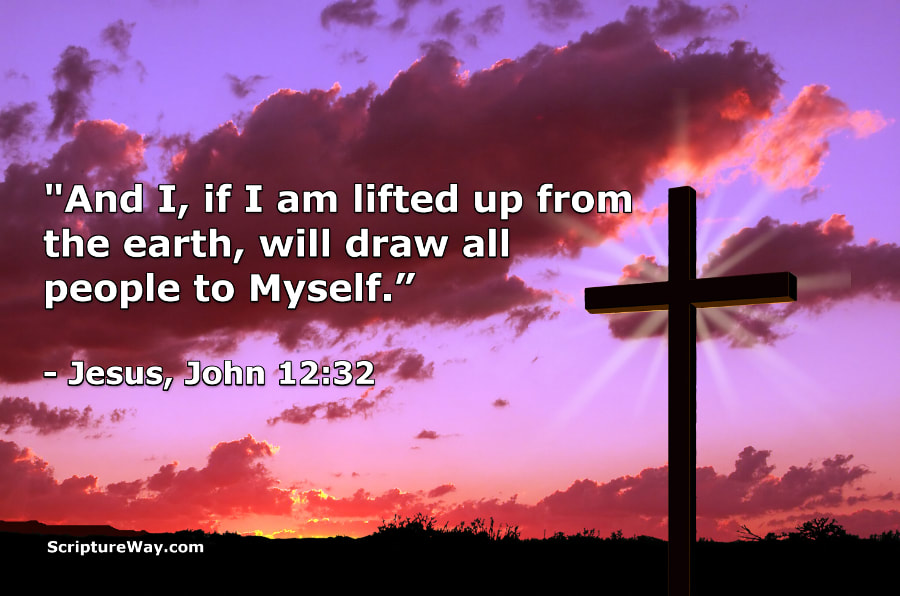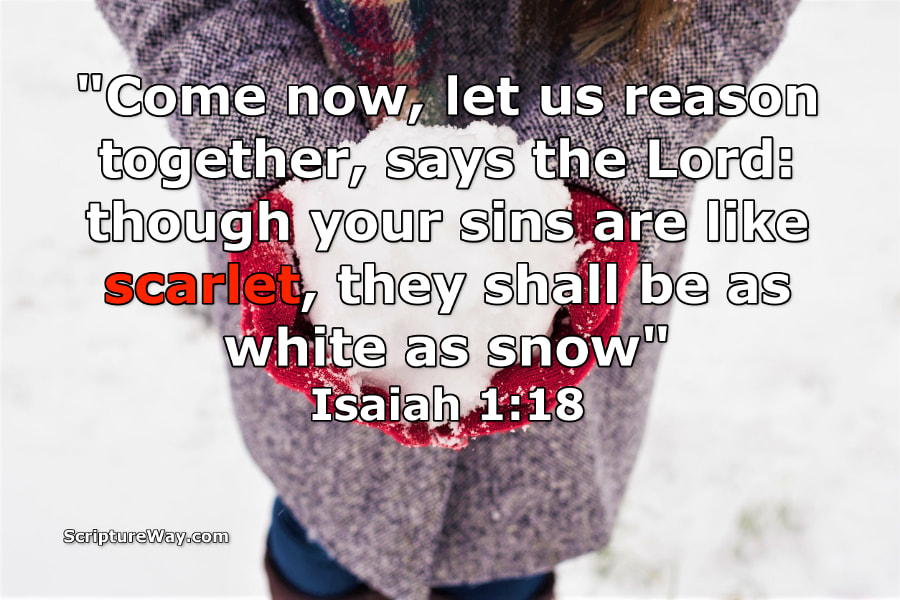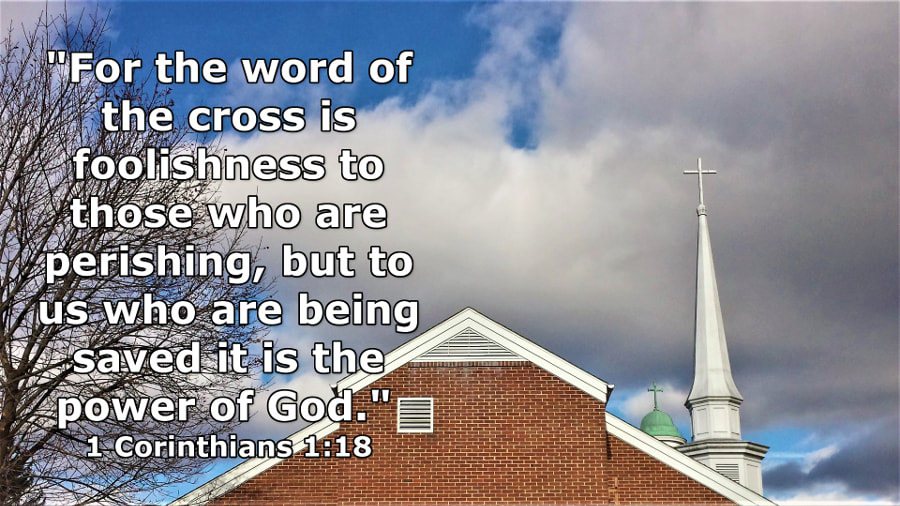"And I, if I am lifted up from the earth, will draw all people to Myself." (John 12:32 NASB)
"And I, if I be lifted up from the earth, will draw all men unto me." (John 12:32 KJV)
This lesson explains what Jesus meant when he said, "And I, if I am lifted up from the earth, will draw all people to Myself" (John 12:32).
Consider. What are you doing in response to Jesus' drawing of you? How are you responding to Jesus' influence in your life?
The scripture references in this lesson are taken from the New American Standard Bible (NASB) unless noted otherwise (Ref. 1).
And I
The "I" here at the beginning of John 12:32 is strongly emphatic (Ref. 2). In John 12:32 Jesus points to himself versus his opposition -- the "ruler of this world" who will be cast out (John 12:31, Matthew 4:8-10). Jesus will assert his rule over the world, and Jesus will draw all (people) to himself (Ref. 2).
If I am lifted up from the earth
Jesus knew with certainty and accurately predicted that his death would be by crucifixion (John 12:32-33, John 3:14-15, Numbers 21:6-9 ESV). Jesus knew that men would crucify him and elevate him above the earth (John 19:17-18). The Greek word for "lift up" in John 3:14 and John 12:32 has two meanings, first to elevate, and second to exalt (Ref. 3).
The people who crucified Jesus thought they were ending his life. However, they didn't realize that God would exalt Jesus through his death, his resurrection, and his ascension to heavenly glory at the right hand of the throne of God (Matthew 28:1-7, Acts 1:8-11, Philippians 2:5-11, Ephesians 1:17-23, Hebrews 12:2). Will draw all (people) to Myself
Jesus said in John 12:32 "And I, if I am lifted up from the earth, will draw all to Myself" (Ref. 4 - Berean Literal Bible). (The NASB and KJV translations add the word "people" or "men" after the word "all"). The Greek word for "draw" [helkó, pronounced hel-koo'-o] means to induce influence, or attract by inward power (Ref. 5). The Greek word for "all" [pas] in John 12:32 means the whole, every kind of (Ref. 6).
Beginning at Pentecost (after Jesus' ascension) and continuing to this day, the drawing of people to Christ is accomplished by the work of the Holy Spirit (Acts 1:8, Acts 2:14-21, Ref. 2). The Holy Spirit's work of drawing people to Christ is for all people -- regardless of ethnicity, national identity, gender, geographic location, or economic or social means. The Holy Spirit does not exclude you from being drawn to Christ because of "who you are." The drawing influence of the Holy Spirit for all people to come to Jesus may be accepted or rejected. Mankind has free will. Some people will reject the influence of the Holy Spirit and the spiritual attraction power of Jesus Christ. Others, praise God, will yield to the drawing influence of the Holy Spirit and will receive Jesus Christ as their Lord and Savior. In Jesus Christ, believers will find acceptance, forgiveness, salvation, love, spiritual empowerment, and the gift of eternal life. How are you responding to the drawing power and influence of Jesus Christ?
Apply. Respond with joy to the drawing power and influence of Jesus Christ, who was lifted up, and died for you. Receive him unto yourself. He will welcome you, forgive your sins, guide you, and will give you eternal life. (Luke 15:20-24, 1 John 1:9, John 16:13, John 3:14-16, Romans 6:23).
References
1. https://www.biblegateway.com/passage/?search=John+12%3A32&version=NASB 2. https://biblehub.com/commentaries/ellicott/john/12.htm Ellicott's Commentary for English Readers - John 12:32 3. https://biblehub.com/greek/5312.htm 4. https://biblehub.com/john/12-32.htm 5. https://biblehub.com/greek/1670.htm 6. https://biblehub.com/greek/3956.htm
0 Comments
"Blessed is the one whose transgression is forgiven, whose sin is covered. Blessed is the man against whom the Lord counts no iniquity, and in whose spirit there is no deceit." (Psalm 32:1-2)
"Pardoning mercy is of all things in the world most to be prized, for it is the only and sure way to happiness." -- Treasury of David (Ref. 1)
This article teaches the seriousness of transgression, sin, and iniquity from Psalm 32:1-2 as well as the blessedness of forgiveness through the atonement of Christ.
Consider. True happiness comes not from the world, nor through "self help," but from God's forgiveness of our sins through the atonement of Christ.
The Blessedness of Forgiveness
Psalm 32:1 begins with an exclamation in the form of an interjection. The opening phrase could be translated "Oh! How blessed is the one whose transgression is forgiven!" (Ref. 2) The Hebrew word for blessed is esher, which is a forceful interjection that means "How happy!" (Ref. 3) David is so joyful that he repeats the exclamation, "Oh! How blessed," again in verse 2. "Blessed is the man against whom the Lord counts no iniquity, and in whose spirit there is no deceit" (Psalm 32:2). Note that true happiness of forgiveness comes from God, not from man.
The word for "man" in Psalm 32:2 is adam, which means mankind, including men, women, and children (Ref. 4). The Threefold Picture of Sin
Psalm 32:1-2 employs three words for sin -- "transgression," "sin," and "iniquity." All three are serious. These words describe the compass of sin and its foulness (Ref. 2). Let's take them in the order described by David, the psalmist.
Transgression defined
Psalm 32:1 says "Blessed is the one whose transgression is forgiven." The Hebrew word for transgression means rebellion (Ref. 5). We commit a transgression against God when we know, or our conscience knows, what God's law teaches, and we go ahead and do the deed anyway.
Sin defined
The Hebrew word for sin written in Psalm 32:1, chataah, means great sin. Chataah occurs only eight times in the Old Testament (Ref. 6, Genesis 20:1-9; Exodus 32:1-4, 19-21).
A similar Hebrew word for sin, chata, occurs more than 200 times in the Old Testament and means do wrong, commit a mistake, or miss the mark or goal (Strong's Exhaustive Concordance Ref. 7, Exodus 20:18-20, Psalm 4:4). Iniquity defined
The Hebrew word for iniquity is avon, which means moral evil (Ref. 8). "'Iniquity' is defined as being wicked or immoral in nature or character. Primarily, it indicates 'not an action, but the character of an action,' and is so distinguished from 'sin'" (Ref. 9). We commit iniquity when we not only rebel against God and miss the mark, but also waver or diverge from the straight path manifest in God's law (Ref. 2).
The Threefold Picture of Forgiveness
Psalm 32 verses one and two describe three aspects of forgiveness - "forgiven," "covered," and "not counted (not imputed)." Let's take each aspect in the order presented.
Forgiveness defined
Psalm 32:1 begins, "Blessed is the one whose transgression is forgiven ..." When God forgives our sins, he lifts them up and carries them away. The Hebrew word for forgiven means to lift, carry away, and bear (Ref. 10).
In the Old Testament, on the annual day of atonement, the scapegoat (literally, goat of removal) carried away the sins of the people into the wilderness (Leviticus 16:7-10, Leviticus 16:29-30, Ref. 11). In the New Testament, Jesus Christ, the Lamb of God, is the one who takes away our sin (John 1:29). Jesus Christ takes away our sin not just annually but once and for all time (Hebrews 9:11-12). "He himself bore our sins in his body on the cross, so that we might die to sins and live for righteousness; by his wounds you have been healed" (1 Peter 2:24). Sin covered
"Blessed is the one whose transgression is forgiven, whose sin is covered" (Psalm 32:1, italics added). The Hebrew word for cover means to hide or conceal (Ref. 12). For the believer in Christ, God hides our sin, covers it with a merciful veil, so it no longer comes into his view as evidence against us (Ref. 2). Christ's atonement is the covering for our sin (Ref. 2).
Iniquity not imputed
Psalm 32 verse 2 in the English Standard Version (ESV) begins, "Blessed is the man against whom the Lord counts no iniquity ..." The Hebrew word for count means impute, charge, or reckon (Ref. 13). Even though our iniquity (moral evil) has been ugly, when we believe in and trust our Lord and Savior Jesus Christ, he does not impute to us (charge us for, take into account, or reckon) that iniquity (Ref. 13).
How Do We Receive the Blessedness of Forgiveness?The blessedness of forgiveness can be known only through the atonement of Christ
Isaiah 53:5 - "But he was pierced for our transgressions; he was crushed for our iniquities; upon him was the chastisement that brought us peace, and with his wounds we are healed."
1 Peter 1:18-19 - "... knowing that you were ransomed from the futile ways inherited from your forefathers, not with perishable things such as silver or gold, but with the precious blood of Christ, like that of a lamb without blemish or spot." 1 John 2:2 - "He is the atoning sacrifice for our sins, and not only for ours but also for the sins of the whole world." We receive forgiveness by acknowledging our sin and confessing our sin to God
Psalm 32:5 - "I acknowledged my sin to You, And my iniquity I have not hidden. I said, 'I will confess my transgressions to the Lord,' And You forgave the iniquity of my sin."
1 John 1:8-9 - "If we say that we have no sin, we deceive ourselves, and the truth is not in us. If we confess our sins, He is faithful and just to forgive us our sins and to cleanse us from all unrighteousness." True happiness (blessedness) comes only through the forgiveness and removal of our sin by Christ, not from anything the world provides.
Apply. Do you want to receive the blessedness of forgiveness for your sins? Acknowledge your sins, and confess your sins to Jesus Christ (1 John 1:9). He will lift away the guilt and pain of your sin and will heal you. You will receive the true happiness of knowing by faith that you are pardoned forever by Christ.
References
1. https://biblehub.com/commentaries/tod/psalms/32.htm 2. https://biblehub.com/commentaries/maclaren/psalms/32.htm 3. https://biblehub.com/hebrew/835.htm 4. https://biblehub.com/hebrew/120.htm 5. https://biblehub.com/hebrew/6588.htm 6. https://biblehub.com/hebrew/2401.htm 7. https://biblehub.com/hebrew/2398.htm 8. https://biblehub.com/hebrew/5771.htm 9. https://www.christianity.com/wiki/sin/what-is-iniquity-meaning-and-importance-in-the-bible.html 10. https://biblehub.com/hebrew/5375.htm 11. https://biblehub.com/hebrew/5799.htm 12. https://biblehub.com/hebrew/3680.htm 13. https://biblehub.com/hebrew/2803.htm
"Come now, let us reason together, says the Lord: though your sins are like scarlet, they shall be as white as snow; though they are red like crimson, they shall become like wool." (Isaiah 1:18)
This lesson is the first in a series on the "Comes" of God's word. This lesson describes God's invitation in Isaiah 1:18, "Come now, let us reason together, says the Lord: though your sins are like scarlet, they shall be as white as snow."
Consider. In Isaiah 1:18-20 (Old Testament), God's forgiveness was conditional on the people's obedience to God. How do people today receive God's forgiveness now that Christ has paid the penalty for sin?
Introduction
Being accused of having hands full of blood was a serious accusation. Yet, that is exactly how the Lord accused the people of Judah and Jerusalem (Isaiah 1:1) in Isaiah 1:15, "Even though you make many prayers, I will not listen; your hands are full of blood." Having hands full of blood is a symbol for the cruel wrongs the people had committed including the guilt of actual murder (Isaiah 1:21, Ref. 1). Isaiah had already spoken against the people for their rebellion against God (Isaiah 1:2) and for the insincerity of their sacrifices, offerings, festivals, and prayers (Isaiah 1:11-15).
Come Now
In Isaiah 1:18, God says "Come now." The Hebrew word for come is halak, which means to go, come, walk (Ref. 2). Here in Isaiah 1:18 "Come" is a summons for the recipient of the message to approach the speaker (God). Although God does not force the people of Judah and Jerusalem to come to him, God strongly urges the people to come to him that they might receive his pardon. Likewise, today God strongly urges all sinners to come to him.
Let Us Reason Together
The Hebrew word for let us reason together, yakach, means to decide, adjudge, prove, and argue (Ref. 3, Job 13:15). The idea is that of a legal process in which each party maintains his own case (Ref. 4, Isaiah 43:26). God proposes to present to the people of Judah and Jerusalem the principles on which he is willing to forgive their sins and bestow his pardon (Ref. 5). God describes the terms for pardon in Isaiah 1:18-20.
Though Your Sins Are Like Scarlet The Crimson or Scarlet Worm (Ref. 7) The Crimson or Scarlet Worm (Ref. 7)
The stain of the people's sins are bright red and indelible like the scarlet dye used by the ancients. The ancients made scarlet and crimson dyes from the dried bodies of the insect (worm), Coccus ilicis found on oak trees in Spain and in the countries east of the Mediterranean (Ref. 5, Ref. 6, Ref. 7).
When it was time for the female Coccus ilicis to give birth, she would attach herself permanently to an oak tree. Her body protected her eggs until the larvae were hatched and able to live on their own. As the mother died, she oozed a crimson fluid which stained her body and the surrounding wood. The death of the female Coccus ilicis paints a picture of the death of Christ who sacrificed his blood on the wood of the cross that others, by believing in him, may live (Ref. 7, Ref. 8).
The scarlet dye was indelible. Cotton material was dipped in this color twice so the stain was permanent (Ref. 5). The stain of the red dye (and likewise the stain of sin in the human heart) could not be washed away by man alone. That is why we as sinners need God's action to wash us clean.
The scarlet dye was known since early in the Old Testament times, centuries before the prophet Isaiah. For further study, I suggest you check these additional references for scarlet in the Bible:
They Will Be White as Snow
Only God can forgive sin. Only God can cleanse people and wash away their sin. David recognized this principle. He prayed to God, "Have mercy on me, O God, according to your steadfast love; according to your abundant mercy blot out my transgressions. Wash me thoroughly from my iniquity, and cleanse me from my sin!" (Psalm 51:1-2). David also wrote, "Wash me, and I shall be whiter than snow" (Psalm 51:7). White symbolizes innocence and purity (Ref. 9). "White as snow " is "a powerful figurative description of the result of forgiveness" (Ref. 10 below).
Though They Are Red Like Crimson, They Shall Be as Wool Scarlet and Crimson Colors (Ref. 11) Scarlet and Crimson Colors (Ref. 11)
Scarlet and crimson are similar reddish colors. Scarlet is bright red with an orange tint. Crimson is a strong, bright, deep red color combined with some blue or violet, resulting in a small degree of purple (Ref. 11). Crimson is associated with the stain of blood (Isaiah 1:15, Ref. 12). The ancients employed crimson color to dye wool (Ref. 5).
The Hebrew word for red in the phrase "red like Crimson" is adom, which means glaring, flagrant in Isaiah 1:18 (Brown-Driver-Briggs, Ref. 13). Though their sins are flagrant and appear as deep stains, God, upon their repentance and reformation, will remove their sins so they will be like wool restored to its original, undyed whiteness (Ref. 14). Forgiveness - By Obedience or by Faith?
In the Old Testament, God's relationship with man was based on obedience to God. Isaiah confirms this point in regard to God's forgiveness. In Isaiah 1:18 God offers forgiveness and cleansing to the people of Judah and Jerusalem. However, God's forgiveness and cleansing was conditional based on their willingness to obey God. Isaiah 1:19-20 describes the conditions for God's forgiveness, and the consequences for not obeying God. "If you are willing and obedient, you shall eat the good of the land; but if you refuse and rebel, you shall be eaten by the sword; for the mouth of the Lord has spoken" (Isaiah 1:19-20, italics added). For further study on God's relationship with man in the Old Testament based on obedience, I suggest reading Deuteronomy 30:15-20.
In the New Testament, God's relationship with man is based on faith in Christ. The Apostle Paul writes, "For by grace you have been saved through faith. And this is not your own doing; it is the gift of God" (Ephesians 2:8). Faith in Christ means believing in, trusting in, and having confidence in Christ (Ref. 15). Peter preached to the Gentiles gathered in Cornelius' house that through the name of Jesus everyone who believes in him receives forgiveness of sins (Acts 10:34-43). God's power to cleanse our sins "white as snow" is through the blood of Christ (1 John 1:7). Summary - Main Principles
Let's review the main principles in this lesson:
1. God invites all sinners to come to him that we might receive his pardon (Isaiah 1:18). 2. The stain of sin is red as scarlet (Isaiah 1:18). 3. Only God can wash our sins white as snow (Isaiah 1:18, Psalm 51:7). As a result of Christ's death, we know that it is the blood of Jesus that cleanses us from all sin (1 John 1:7). 4. In the Old Testament, God's forgiveness was conditional on the people's obedience to God (Isaiah 1:18-20). In the New Testament, God provides forgiveness and cleansing through faith in Christ (Ephesians 2:8, Acts 10:43).
Apply. If you do not know Christ, come to him, confess your sin, and ask him to forgive you. Put your faith and trust in him and walk in the cleansed life that Christ has given you. If you do have faith in Christ as your Savior, walk with him in the light. Thank him for forgiving your sin and for cleansing you from all unrighteousness (1 John 1:7-9).
Related Lessons
"God's Great Invitation - Come, Satisfy Your Thirst" (Isaiah 55:1) "Jesus' Invitation - Come to Me and Rest" (Matthew 11:28-30)
References
1. https://biblehub.com/commentaries/cambridge/isaiah/1.htm Cambridge Bible for Schools and Colleges - Isaiah 1:15 2. https://biblehub.com/hebrew/1980.htm 3. https://biblehub.com/hebrew/3198.htm 4. https://biblehub.com/commentaries/cambridge/isaiah/1.htm Cambridge Bible for Schools and Colleges - Isaiah 1:18 5. https://biblehub.com/commentaries/barnes/isaiah/1.htm Barnes' Notes on the Bible - Isaiah 1:18 6. https://www.biblegateway.com/resources/encyclopedia-of-the-bible/Scarlet 7. https://www.discovercreation.org/blog/2011/11/20/the-crimson-or-scarlet-worm/ 8. https://studybible.info/strongs/H8438 9. https://www.biblegateway.com/resources/encyclopedia-of-the-bible/White 10. The NIV Study Bible, Zondervan Bible Publishers, 1985, note on Isaiah 1:18 11. https://en.wikipedia.org/wiki/Shades_of_red 12. https://biblehub.com/commentaries/ellicott/isaiah/1.htm Ellicott's Commentary for English Readers - Isaiah 1:18 13. https://biblehub.com/hebrew/119.htm 14. https://biblehub.com/commentaries/jfb/isaiah/1.htm Jamieson-Fausset-Brown Bible Commentary - Isaiah 1:18 15. https://biblehub.com/greek/4102.htm
"For the word of the cross is foolishness to those who are perishing, but to us who are being saved it is the power of God." (1 Corinthians 1:18)
"Those who receive the gospel, and are enlightened by the Spirit of God, see more of God's wisdom and power in the doctrine of Christ crucified, than in all his other works." -- Matthew Henry (1662-1714) (Ref. 1, Ref. 2)
This lesson describes what the Apostle Paul meant by the phrase, "the word of the cross." God loves us so much that Jesus Christ died on the cross for us, and purchased the forgiveness of our sins. We will also study why for some people, the word of the cross is foolishness and for others, it is the power of God.
Consider. When the Apostle Paul wrote the phrase, "the word of the cross" (1 Corinthians 1:18), what did he mean? In your own words, how would you explain "the word of the cross" to someone else?
Definition of "word." The Greek word for word in 1 Corinthians 1:18 is logos. Logos means something said, a message, reasoning expressed by words, and instruction (Ref. 3). Acts 13:26 and 2 Corinthians 5:19 provide examples where logos is translated as message.
Definition of "cross." The Greek word for cross is staurós. Staurós has both a literal meaning and a figurative meaning. Christ was crucified on a literal Roman cross (Ref. 4). According to HELPS Word-Studies, "Staurós was the crosspiece of a Roman cross; the cross-beam was placed at the top of the vertical member to form a capital 'T' (Ref. 4). "This transverse beam was the one carried by the criminal" (Ref. 4, Matthew 27:31-32, John 19:17). In addition to the shape of a capital "T," researchers also discuss the cross in the shape of a cruciform ("†" or "✚") and as a vertical stake (Ref. 5). Most Christian denominations present the Christian cross in the shape of a cruciform (Ref. 5, Ref. 6).
Staurós also has a figurative meaning. Jesus spoke about the cross each believer bears to be his true follower (Ref. 4, Matthew 10:38, Mark 8:34, Luke 9:23). Thayer's Greek Lexicon describes the figurative cross as an expression used by "those who, on behalf of God's cause, do not hesitate cheerfully and manfully [courageously] to bear persecutions, troubles, distresses — thus recalling the fate of Christ and the spirit in which he encountered it" (Ref. 4, brackets added). What is meant by the expression, "the word of the cross"?
The word, or message, of the cross is that God loves us so much that his Son, Jesus Christ, was crucified and died on the cross for us. Through his sacrifice, Jesus Christ has purchased the forgiveness of our sins. Through Jesus Christ, those who believe in him receive salvation and eternal life.
"But God demonstrates His own love toward us, in that while we were yet sinners, Christ died for us" (Romans 5:8). "For God so loved the world, that He gave His only begotten Son, that whoever believes in Him shall not perish, but have eternal life" (John 3:16). Foolishness to those who are perishing
The Greek word for foolishness is mória. Mória means folly, absurdity, foolishness (Ref. 7). The Greek word for perish is apollumi which means destroy utterly (Ref. 8). HELPS Word-Studies further defines apollumi as "to die, with the implication of ruin and destruction" (Ref. 8).
Why would Paul write that the message of the cross "is foolishness to those who are perishing" in 1 Corinthians 1:18? 1. "To the Jews 'the cross' was the tree of shame and horror; and a crucified person was 'accursed of God' " (Ref. 9, Deuteronomy 21:23). To the Jews, the thought of "a crucified Messiah" seemed "a revolting folly" (Ref. 9). 2. To Paul's Greek audience, the cross was the punishment for slaves and murderers (Ref. 9). The cross meant shame and agony. To the Greeks, worshiping "a crucified malefactor" was superstitious (Ref. 9). 3. Paul explains, "But a natural man does not accept the things of the Spirit of God, for they are foolishness to him; and he cannot understand them, because they are spiritually appraised" (1 Corinthians 2:14). The natural man, who is "not truly enlightened and renewed by the Word and Spirit of God, and therefore has no other way of obtaining knowledge but by his senses and natural understanding … does not understand or apprehend the things of the Spirit of God" (Ref. 10). To us who are being saved it is the power of God
The Greek word for saved is sózó, which means rescued from destruction and brought into divine safety (Ref. 11). The Greek word for power in 1 Corinthians 1:18 is dunamis. Dunamis means (miraculous) power, might, strength (Ref. 12).
The cross is much more than a decoration. "The cross is God's saving power" (Expositor's Greek Testament, Ref. 13). For us who are being saved, the cross is the means by which Jesus has forgiven our sins and rescued us from the path of destruction. By the cross, God offers us the gift of eternal life when we believe in Jesus Christ, God's Son. When we share the "word of the cross" with others, we share not a fable but God's mighty plan for saving people. "For I am not ashamed of the gospel, for it is the power of God for salvation to everyone who believes, to the Jew first and also to the Greek" (Romans 1:16).
Apply. God gives us only two choices. Either we are on the path of perishing or we are on the path of salvation. On which path are you? If you do not know Christ, put your faith in him today, and receive from him forgiveness of your sins and the gift of eternal life. If you do know Christ, thank him for his sacrificial death on the cross to forgive your sins, and for his power working in you each day.
References
1. https://biblehub.com/commentaries/mhc/1_corinthians/1.htm 2. https://en.wikipedia.org/wiki/Matthew_Henry 3. https://biblehub.com/greek/3056.htm 4. https://biblehub.com/greek/4716.htm 5. (Ref. 5 begins on the next line) https://en.wikipedia.org/wiki/Instrument_of_Jesus%27_crucifixion 6. https://en.wikipedia.org/wiki/Christian_cross 7. https://biblehub.com/greek/3472.htm 8. https://biblehub.com/greek/622.htm 9. https://biblehub.com/commentaries/pulpit/1_corinthians/1.htm 10. https://biblehub.com/commentaries/benson/1_corinthians/2.htm 11. https://biblehub.com/greek/4982.htm 12. https://biblehub.com/greek/1411.htm 13. https://biblehub.com/commentaries/egt/1_corinthians/1.htm |
Daily Bible Verse(Click the link above) AuthorMr. Whitney V. Myers. Christian. For more information, please visit the Author Page. Posting ScheduleI plan to provide new postings about once a month. Planned Topics(subject to change) Recent Posts(most recent three months) Popular Posts(top 10) Categories
All
Archives
July 2024
|
|
Copyright 2018-2024 Whitney V. Myers |
Listed in Feedspot's Top 100 Bible Study Blogs and Websites |




 RSS Feed
RSS Feed
